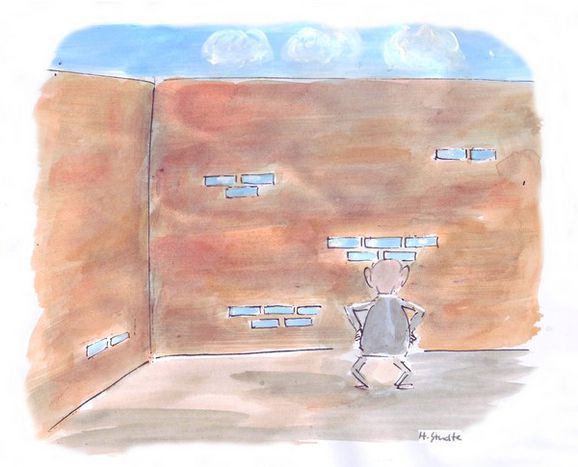
It's like talking to a Berlin wall
Published on
Translation by:
Sarah Truesdale140 kilometres of wall crumbled in 1989 and hundreds of European expressions arose as it fell. The idiom of the week is flavoured by the 9 November event
A 40-year-old Frenchman was 20 on 9 November 1989, a day when he was probably watching images of the fall of the Berlin wall on his television with tears in his eyes. At the same time, a little 80-year-old Polish woman probably couldn’t believe her eyes. That wall had been there for 28 years, it had become a part of the landscape.
The Zonis , as the ‘people of the zone’ were called in West Germany (although the 'zone' was actually in West Berlin, as it was like an island - ed), were suddenly able to cross the todesstreifen
, as the ‘people of the zone’ were called in West Germany (although the 'zone' was actually in West Berlin, as it was like an island - ed), were suddenly able to cross the todesstreifen , the 'death strip' which had separated them. All of a sudden, they were no longer au pied du mur
, the 'death strip' which had separated them. All of a sudden, they were no longer au pied du mur or with their backs against the wall as the French and English expressions go. It was no longer a question of faire le mur
or with their backs against the wall as the French and English expressions go. It was no longer a question of faire le mur , to go over the wall by escaping and risking your neck. There was no longer the need to negotiate muro contro muro
, to go over the wall by escaping and risking your neck. There was no longer the need to negotiate muro contro muro (wall to wall). The fight between the east and the west was like fighting against a wall of rubber: lottare contro un muro di gomma
(wall to wall). The fight between the east and the west was like fighting against a wall of rubber: lottare contro un muro di gomma , as the Italians say, in a fight without a solution.
, as the Italians say, in a fight without a solution.
It’s hard to imagine the life that the Germans had before: at that time, communicating with the west was like parler à un mur parlare con un muro, talking to a wall
parlare con un muro, talking to a wall or, peculiarly, like throwing peas against a wall (jak grochem o ścianę
or, peculiarly, like throwing peas against a wall (jak grochem o ścianę ) if you were a Pole. When they can’t communicate with the other side, the Germans say that there are walls of silence – mauer des Schweigens
) if you were a Pole. When they can’t communicate with the other side, the Germans say that there are walls of silence – mauer des Schweigens . Happily, between you, me and these four walls
. Happily, between you, me and these four walls , secrets most probably crossed barbed wire fences, despite the fact that German (wenn Wände Ohren haben
, secrets most probably crossed barbed wire fences, despite the fact that German (wenn Wände Ohren haben  ), French (les murs ont des oreilles
), French (les murs ont des oreilles ) and Polish (sciany maja uszy
) and Polish (sciany maja uszy )walls have ears. It was no longer the time to be a wallflower (Mauerblümchen
)walls have ears. It was no longer the time to be a wallflower (Mauerblümchen  in German), Time to stop leaning against the wall (podpierać ścianę), in a Polish reference about not being invited to dance at a party. That day, there was no more driving people up the wall
in German), Time to stop leaning against the wall (podpierać ścianę), in a Polish reference about not being invited to dance at a party. That day, there was no more driving people up the wall  . From France to Poland, it was time to face the wall together - fare muro
. From France to Poland, it was time to face the wall together - fare muro , as the Italians say, by ultimately smashing it down.
, as the Italians say, by ultimately smashing it down.
Translated from Au pied du mur



